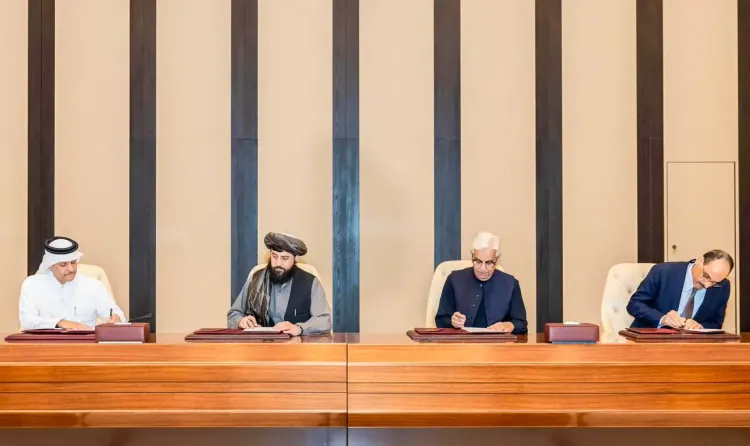Why Did the Istanbul Talks Between Afghanistan and Pakistan Fail?

Synopsis
Key Takeaways
- Talks concluded without agreement
- Significant differences remain between delegations
- Security concerns over TTP highlighted
- Need for continued dialogue emphasized
- Potential for increased regional instability
Kabul, Oct 28 (NationPress) The recent discussions between representatives of Pakistan and Afghanistan in Istanbul concluded without yielding any results, with mediators pointing to significant differences that obstructed a consensus on security issues, according to local media reports on Tuesday.
The negotiations, which spanned three days, failed to produce any significant outcomes despite efforts for regional mediation. It was acknowledged by mediators that the two countries’ positions were markedly divergent due to conflicting expectations and priorities. These discrepancies prevented officials from achieving any advancements during the dialogues, as reported by Afghanistan’s prominent news agency Khaama Press, referencing a report from Geo News. The lack of collaborative efforts has raised alarms about the potential for escalation.
Pakistan maintains that addressing the threat from Tehreek-e-Taliban (TTP) and ensuring that its fighters do not find refuge in Afghanistan are crucial prerequisites for any agreement. The TTP insurgency is viewed as a direct threat to Pakistan's national security.
Experts have pointed out that the unsuccessful negotiations highlight the deep-seated mistrust between the two nations and underscore the challenges in combating cross-border militancy. They caution that a prolonged deadlock could jeopardize stability in both countries.
In light of recent border skirmishes, Islamabad has issued warnings that it will persist in conducting military operations within Afghan territory if assaults by TTP militants continue. Security officials have emphasized the necessity for decisive actions to safeguard civilians and military positions along the border.
The initial round of Pakistan-Afghanistan talks, facilitated by Qatar and Turkey, took place in Doha on October 18-19.
As both delegations convened in Istanbul for the follow-up discussions, Pakistan's Defence Minister Khawaja Asif escalated the rhetoric by threatening Kabul with an 'open war' should the negotiations prove fruitless.
Reports from Pakistani media indicate that Islamabad is also seeking to establish a 'third-party oversight mechanism', potentially co-chaired by Turkey and Qatar, to monitor progress and ensure compliance.
The relationship between Kabul and Islamabad has entered a tumultuous phase, particularly as tensions along the Durand Line have resulted in multiple confrontations in recent weeks.
Afghanistan's Foreign Minister Amir Khan Muttaqi's recent week-long trip to New Delhi starting October 9 was met with significant hostility from the Pakistani establishment, coinciding with drone attacks on the first day of his visit to Kabul.
In the wake of India suspending the Indus Water Treaty following a Pakistan-backed terrorist attack in Pahalgam on April 22, Afghanistan has announced intentions to expedite dam construction on the Kunar River, which is anticipated to escalate tensions in Islamabad.









